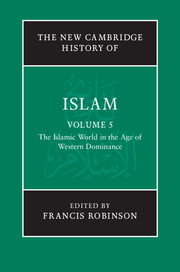Book contents
- Frontmatter
- Introduction
- PART I THE ONSET OF WESTERN DOMINATION C. 1800 TO C. 1919
- PART II INDEPENDENCE AND REVIVAL C. 1919 TO THE PRESENT
- 11 Turkey from the rise of Atatürk
- 12 West Asia from the First World War
- 13 Egypt from 1919
- 14 Sudan from 1919
- 15 North Africa from the First World War
- 16 Saudi Arabia, southern Arabia and the Gulf states from the First World War
- 17 Iran from 1919
- 18 Central Asia and the Caucasus from the First World War
- 19 Afghanistan from 1919
- 20 South Asia from 1919
- 21 South-East Asia from 1910
- 22 Africa south of the Sahara from the First World War
- 23 Islam in China from the First World War
- 24 Islam in the West
- Glossary
- Bibliography
- Index
- References
23 - Islam in China from the First World War
from PART II - INDEPENDENCE AND REVIVAL C. 1919 TO THE PRESENT
Published online by Cambridge University Press: 28 March 2011
- Frontmatter
- Introduction
- PART I THE ONSET OF WESTERN DOMINATION C. 1800 TO C. 1919
- PART II INDEPENDENCE AND REVIVAL C. 1919 TO THE PRESENT
- 11 Turkey from the rise of Atatürk
- 12 West Asia from the First World War
- 13 Egypt from 1919
- 14 Sudan from 1919
- 15 North Africa from the First World War
- 16 Saudi Arabia, southern Arabia and the Gulf states from the First World War
- 17 Iran from 1919
- 18 Central Asia and the Caucasus from the First World War
- 19 Afghanistan from 1919
- 20 South Asia from 1919
- 21 South-East Asia from 1910
- 22 Africa south of the Sahara from the First World War
- 23 Islam in China from the First World War
- 24 Islam in the West
- Glossary
- Bibliography
- Index
- References
Summary
Since the First World War China has been engaged in an unremitting project of nationalisation that includes, among other things, emancipation from its imperial past, engagement with Western political institutions and establishment of its sovereignty over its bounded territory. One recent challenge to this nationalist project, with roots in the early twentieth century, is that of a widespread separatist movement among one Muslim group known as the Uyghur. That the largest Muslim group in China, known as the Hui, have not participated in or been sympathetic to such a movement speaks volumes regarding the diversity of Islamic identity and practice in China over the last century. Recent events related to 11 September 2001 illustrate China’s ongoing attempts to integrate its diverse Muslim populations to Chinese rule.
As part of China’s continuing efforts to maintain national unity and police separatist movements at home and abroad, on 14 December 2003, for the first time in its history, the Ministry of Public Security released a list of four organisations and eleven individuals that it deemed to be terrorists. This list included: the Eastern Turkistan Islamic Movement (ETIM), which was identified as an international terrorist organisation by the United Nations in 2002 after Chinese and US prompting (see below); the Eastern Turkistan Liberation Organisation; the World Uyghur Youth Congress (WUYC); and the Eastern Turkistan Information Centre.
- Type
- Chapter
- Information
- The New Cambridge History of Islam , pp. 659 - 685Publisher: Cambridge University PressPrint publication year: 2010

